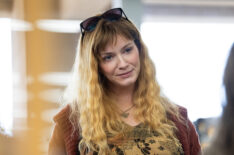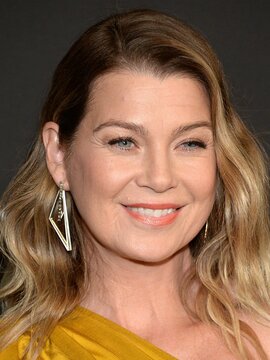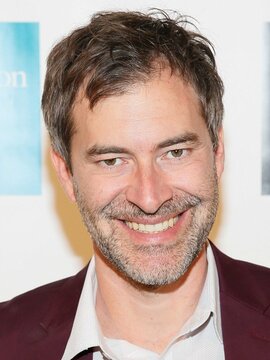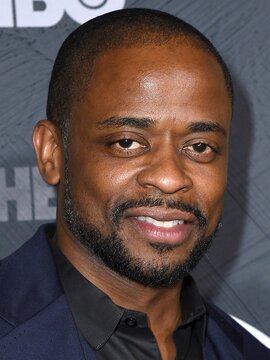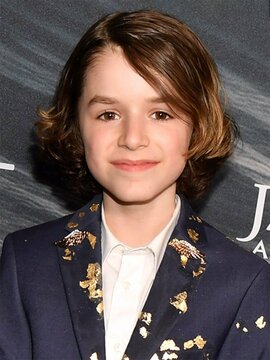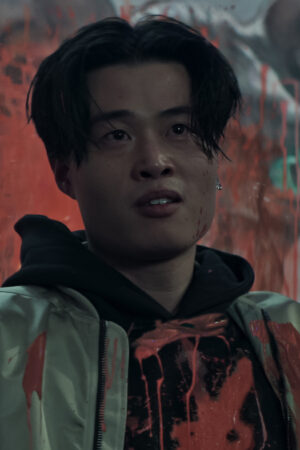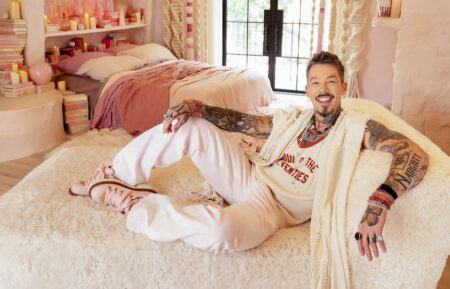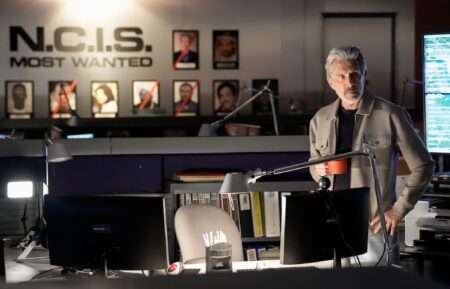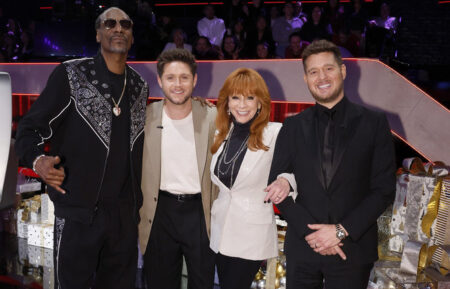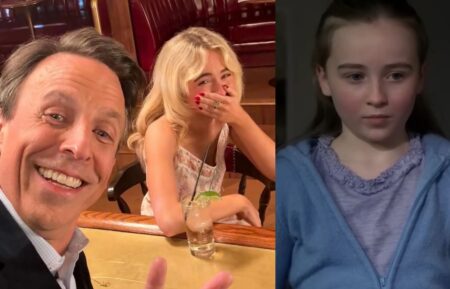Dulé Hill Talks ‘Good American Family’ Interrogation Scenes & Miscarriage of Justice for Natalia Grace

Exclusive
[Warning: The following post contains MAJOR spoilers for Good American Family Episode 7, “If You Tell a Story Well Enough.”]
The agony of injustice continues on Good American Family‘s latest episode. This time, we get a flashback to the moment when Natalia Grace (Imogen Faith Reid) finds out she’s been re-aged by the courts. She’s already locked away in an institution and is suddenly switched from the children’s wing to the adult ward; so she goes from telling innocent ghost stories with her friend to being threatened with shackles for misbehavior. The saddest part? She lost her Hercules bunny, the one thing that was ever hers from the Barnetts. The memory is part of the on-camera statement she’s decided to provide for Detective Drysdale (Dulé Hill), and it gives him an idea: Since Natalia wasn’t present for the re-aging hearing, she didn’t get due process, and they can petition for reconsideration.
We then see the Barnetts experiencing their version of martial bliss in Canada — with Kristine (Ellen Pompeo) busy being famous and having a hairdresser making house calls and such, while Michael (Mark Duplass) bakes goodies for her and the kids on Valentine’s Day. Their bliss is disrupted a bit by a letter revealing Natalia’s new family is petitioning to have her real age restored. They deny it again and again for years until they get a new request: The Mans now want to become Natalia’s legal guardians. They can’t have that, though, because then the Mans will be able to re-age her themselves, and the Barnetts will be guilty of abandoning a child. She sends Michael to meet with an attorney in Indiana and fight the proposal.
Once there, he receives an explicit text image from Kristine and knows it’s not meant for him. After confronting her about it on a call, Michael seizes an opportunity to hook up with his former Circuit City colleague who’s had a shine for him. With his marriage over, will he finally stop doing Kristine’s bidding in this case? No.
Natalia prepares for court by writing a statement about herself that even features a witty joke — a clear contrast to the last time we saw her struggling to write about her life — but she won’t get to use it. Michael shows up to the courtroom and claims unity with Kristine about Natalia’s true age, and, thanks to the testimony of their family doctor (who only examined her once), the judge rules against Natalia without letting her breathe a word. Natalia crumples up her statement in abject despair.
Detective Drysdale is furious and wants to fight, but Cynthia (Christina Hendricks) won’t put the girl through that again. A few years later, Drysdale has become an adoptive father in his own right and remembers his anger over the outcome of the case. He researches the files on his own time and pursues a charge against the Barnetts. But first, he’ll need proof.
With Michael now remarried and estranged from his children after Kristine claimed spousal abuse, Drysdale plays to those frustrations and gets Michael to admit on tape that Kristine abused Natalia. The Barnetts begin a media blitz as their main means of defense, but the penultimate episode ends with Natalia following suit with her own nationally televised interview.
The journey that Natalia goes on leaves Drysdale frustrated with the very judicial system he has served his entire career, so to break down everything the character goes through in his quest to help Natalia, TV Insider caught up with Dulé Hill!
You based this character on an amalgamation of different people that were involved in the case. Was there any basis for the fatherhood aspect, in his personal life, in reality?
Dulé Hill: Oh, that’s a good question. You know what? I think that that may have been something that came out of Katie Robbins and Sarah Sutherland. But it was something that I think really was interesting to me about the character and the journey that Detective Drysdale went on because at first, he did not have his own child, but It made it that much more effectual for him once he did have his own child to realize that there was a child out there who he knew, at least from his point of view, wasn’t getting the same things that he was able to give his child.
And then also I think what was really touching about that, too, was the dream-deferred aspect of it… He had a desire for a family for so long, and he had to be patient through the process and wait for it. But then somebody else was able to have a family, and from his point of view was not willing to give that love and base support there for the child was really, it was something that he needed. That really motivated him to keep on pressing forward.
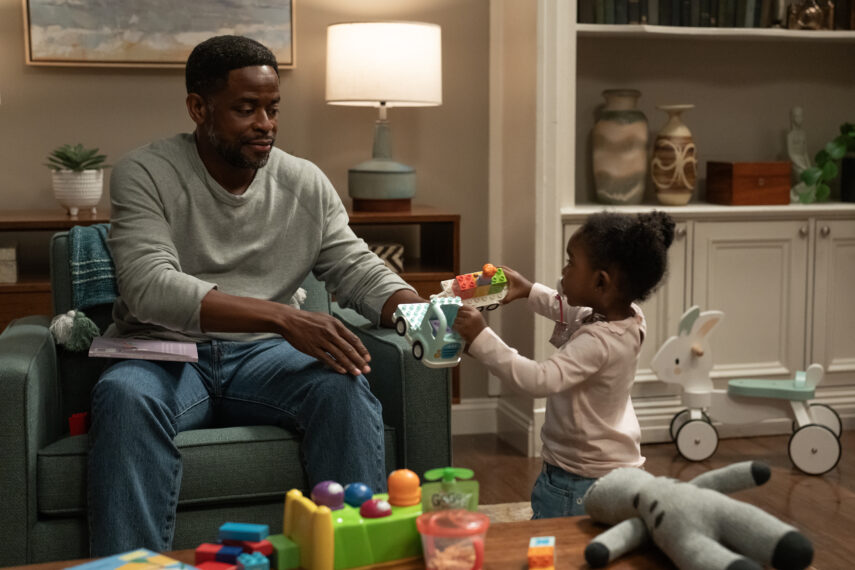
Disney / Ser Baffo
Going back to the beginning of the episode, when Drysdale is interviewing Natalia, she says something really heartbreaking — that she lost her toy bunny Hercules. That’s a reminder of just how tender this child was. But at the same time, Drysdale talks to her like an adult. He reasons with her as though she’s logical, even though at this point in the story she’s only 13. Can you talk about crafting that conversational dynamic with Imogen, about this character?
I think for myself, I really took it from my own experience. I have two very bright children. One is older now — she is 20 — and then my son is 5 going on 50. And I think just having that real-life experience informed me of a way to approach the role because I have grown-up conversations [with kids] all the time. I think oftentimes we put it on children that they don’t know. But I think the reverse is actually what is true.
I’ll never forget there was a mentor I had throughout most of my life, a good friend of the family, his name is Dr. Ibrahim Abdul Malik. And he was, at the time, in his early 90s, and I finally was able to bring my son to meet him here in New York. And both Jazmyn and I were saying, “Man, he’s so fresh. He doesn’t know anything. We have so much to teach him.” And he said, “Let me correct you on that.” He said, “Children come into this world knowing a lot. They’ve just not figured out how to communicate it with us yet. They know how they feel. They know what they want. So it’s our job to be able to understand what the children want and then go from there.” That always stuck with me because you always think, as a little child, they don’t know anything. No, they actually know a lot. Anyway, that’s a long-winded way of me saying I used all of that in those dynamics with Natalia…. Imogen, he was so phenomenal as Natalia, I keep calling her Natalia.
Another interesting dynamic with Drysdale is what he has with Cynthia. Obviously, they start out butting heads, especially at the doctor’s office when he’s he’s not sure about her. And even when they’re working together, there’s a little bit of a confrontational air between them. Can you talk about developing that dynamic with Christina?
Well, one, Christina is just a phenomenal actress. She’s a wonderful artist who brings so much as the camera just starts to roll. So I think as an actor, as long as you are listening, and you are staying connected, if you’re working with another actor — someone as wonderful as Christina — there isn’t much to develop because she gave so much. I mean, I wouldn’t say that we overtly talked about it. I know even from Christina’s side, I mean, she joined the cast and I think within like 36 hours she was on the set, so she really came in and hit the ground running. But really, it was all right there [in the script]. You can’t help but feel that energy and not be aware of it and react to it. I think Katie Robbins and Sarah Sutherland did a wonderful job of crafting the nuance of the relationship.
For myself, especially in this story, but I think in life as well, there’s always shades of truth, and I think for Drysdale, he took [Cynthia] with a grain of salt. He appreciated her, but also I think he was not completely sure of her as well. So that’s why I think a lot of that headbutting came up. Their approaches to things were different. Yeah, and I think that was the oil and vinegar aspect of Cynthia Mans and Detective Drysville, the aspect of them that you saw on the screen.
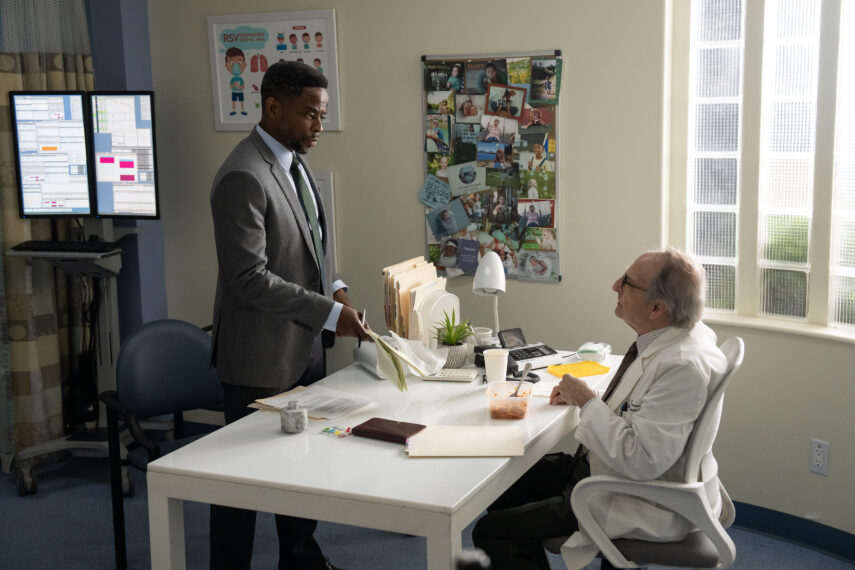
Disney / Ser Baffo
There are two points in this episode where Drysdale gets to use his detective interrogation skills. First is when he goes to visit Dr. Lawrence. It starts out real casual. The guy’s eating his noodles and talking, and then basically, he turns the office into an interrogation room. Can you talk about leaning into that crescendo of becoming a policeman in real time?
I mean, really, I approached it musically, if that makes any sense. It really was just playing a song with the person that you were looking to get the information from. And some pieces of music will start off just hitting you hard, but other ones will [twiddles fingers] — it sounds so lovely as they begin, “Oh this is nice and easy and warm,” and then as it goes. It keeps building, and it transitions really into a full-on press, and that was really the thing. And maybe that’s because of my musical theater background or me being a tap dancer, but that is how I saw that scene happening.
I really appreciated playing a role like that, a scene like that, with the dynamic of being able to come in and [build]. In life, there’s always a little bit of a sweet and sour, and I and I appreciate being able to play that on screen…love David Paymer. And to be able to do a scene with him… They really assembled a wonderful cast of artists. They really did. And every time you got a chance to do a scene, you were working with actors who hit the ground running and were ready to play, and David Paymer played who, from my point of view, is this sleazy slimeball doctor — he played him so, so well that actually made it fun to corner him and to get him caught up. Because through the whole process, he thought he was smarter than everybody else, and I appreciated being able to play the one who really Caught him up. I appreciate being able to play the chicken who came home to roost. “Now here you are, you have played this hand too hard.” I love that.
The subsequent interviews with the specialists are pretty shocking. Drysdale already knew she was a child, but then he’s still surprised to find out that the Barnetts already knew that and continued the re-aging process. Is he more shocked about the physiological details that he learns or the fact that they’re doing stuff?
That’s a good question… I would think it was a double-sided coin for Drysdale. I’m gonna take the easy way out of the question. I think it was a double-sided coin because he can connect to both of those things. Drysdale is a parent, and the idea that any of it could happen, I think was really twisting him. It would not allow him to relax and to sleep. The idea that they would even do this, it completely blew his mind or my mind and shattered my [senses].
And then the other side of it, though, I think it really affected Drysdale more — now that I’m talking about it — that it happened in our legal system because he is a part of law enforcement. That was the thing that he really [hurt]. He built his whole career on, “No, if you do the crime, you do the time. And if you follow the facts, and the facts prove one thing, that is how it ends.” So I’m going to revise my answer to say no, I think that it was more the legal aspect of it because he is in law enforcement. He does see things. All sorts of people, they do all sorts of wild and crazy things, but the idea that the facts, in his mind, could say one thing and it could have occurred within the legal system, I think it was earth-shattering for Detective Drysdale. I mean, we don’t go forward into the future, but in my mind, Detective Drysdale may have even left law enforcement at that point because he realized that the gospel that is preached is not always what is lived.
Yeah, that was another question I had is just how much does it break his heart that the judicial system as a whole just fails this girl again and again and again, even when he uses every weapon that he has to his to her advantage?
I think it completely shattered his heart, and what I loved about playing the character is, I think there are, in reflection of our society, I think there are a lot of Drysdales in the world — not just those who are detectives, but those who have a belief in the system, and they have an absolute, blind faith in a system that it is infallible, whether you’re talking about law enforcement or government … and when it turns out that that is shattered for you, that what you thought something was, you realize is not, it is earth-changing for you. Your ground completely, completely shifts because if I have built my life knowing that A equals B equals C or they follow each other and 1 + 1 equals 2 and 2 + 2 equals 4 and 4 + 4 equals 8, then I realized that no, 4 + 4 does not equal 8, actually 4 + 4 equals 0, what do you do? He’s not a 5-year-old child. He’s a grown man.
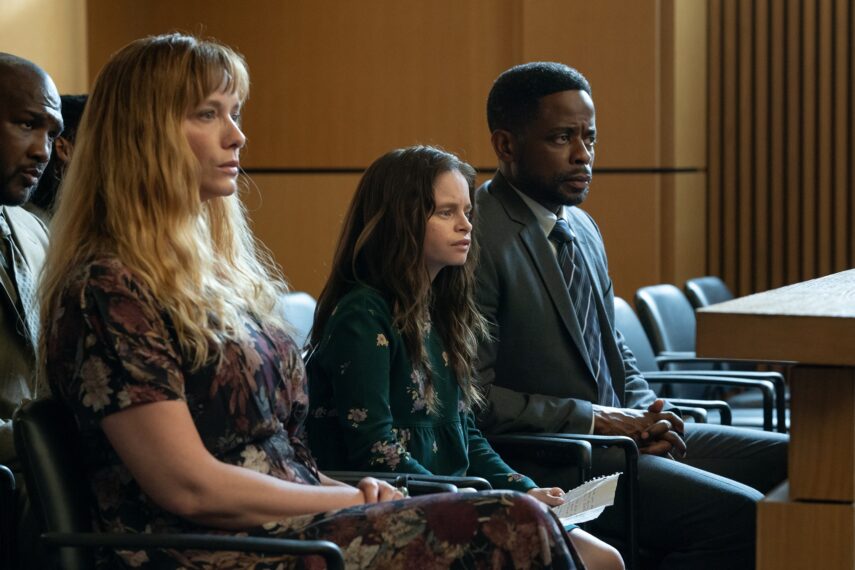
Disney / Ser Baffo
I want to talk about the interview with Michael next. You get the title line, which is, “if you tell a story well enough,” is that him just trying to coax information out of him, or is he a little bit rubbing it in his face that Michael’s been telling this lie about Natalia?
At this point, I think it’s I think he truly believes that [statement]. I think it’s both. I think it’s rubbing it in his face a little bit. I think he does enjoy this game of cat and mouse. That’s why he does what he does. There’s a part of him that really [thinks], “Oh, you think you’re smarter than me? You think you’re wiser than me? You think you can be slicker than me? But here’s what, you can’t.” And not just with Michael. I think in general, I think a part of the job that Detective Drysdale still enjoys the most is the interview process because it becomes a real game of cat and mouse, and it really is intellectual sparring, and he enjoys that.
I think it was some of rubbing it in his face, some of letting him know that, “I know your game.” And I think also it is where he has grown into over the course of this case and his experience with the legal system through it all. Because I don’t know if he would have said that same statement 15 years ago. I think 15 years ago, he may have said, “Follow the clues, and the evidence is going to lead you to where it is, and then justice will be served in that way.” And I think it’s a reflection of the journey that he’s been on with this case that it shows how he has evolved. So he’s actually saying back to the person, “I know your whole game.” I really loved that line when I read it, I was like, “Ooooh.” Because again, going back to Katie and Sarah, the entire writing staff, it’s like, I love when you can do pieces of material that tell a story, bring you on a creative dynamic, but also, gives you nuggets that can help you reflect on where you are in society, and that is so true where we are today. It’s kind of shockingly and heartbreakingly true because you tell a story well enough, the truth doesn’t always matter… That one hit me deep when I read that I was like, “Oh, so y’all better write!”
Your character deals with Natalia and Imogen in her perspective, where she is a child. What’s it been like for you to watch the show as a whole and see that first half when she’s portrayed as this kind of creepy, villainous type?
The first thing is, it really continues my infatuation with Imogen’s craftsmanship. I mean, she really is a dynamic actress. She did a wonderful job crafting this role, and being able to change the nuance of how you approach the role, depending on which point of view that you are in? I didn’t get a chance to see all of that on the set because I’ve mostly been in a different point of view, and I really appreciate doing the scene work that I did do with her, but we seeing the flip side of it, I really was like, “Man, like she’s really just a really brilliant actress.” I think it was Episode 5, that was the one when it switches, when you start to [see the shift], and I mean, I was like, “Oh my gosh. She just did such magnificent work,” so I can’t stop saying that. The second part of it, it really is amazing to me. It all depends on which glasses you have on. I’m like, “Wow, it’s the same story, but not. It’s the same cast of characters, but a completely different tale that is being told.” And again, like for me, I do believe that art reflects life, and for me, I always look for those things in the projects that I do, and even in other projects that I just have the opportunity to see. Take pieces of it to reflect on my own journey, and the journey around me, and it has only inspired me or reminded me to ask more questions, to dig a little deeper, to be a little more inquisitive, just in general — in personal relationships, in more distant ones — just to be a little bit more inquisitive. Because you really can get a completely different story depending on who’s telling the story., I think there may have been a line — I don’t know if they actually made it to the series or not — but Drysdale said something about like, “It all depends on who’s doing the telling.” And that’s something that I think stays with it as I see in this show, like, “Wow, it really does matter who’s doing the telling because this is a completely different story and there’s such power in that.” So, Bravo to Katie Robbins and the entire team.
Good American Family, Wednesdays, Hulu

